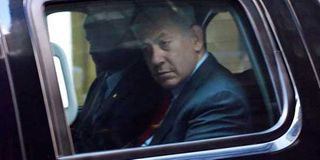Trump tells Netanyahu he'll recognise Jerusalem as Israel's 'undivided' capital

Israeli Prime Minister Benjamin Netanyahu is seen departing after a meeting with US Republican presidential nominee Donald Trump on September 25, 2016 in New York. Trump promised to recognise Jerusalem as Israel's "undivided" capital if he is elected president. AFP PHOTO | MANDEL NGAN
What you need to know:
- Israel captured the Arab eastern half of Jerusalem during the 1967 Arab-Israeli war, and annexed it in 1980, declaring all of Jerusalem Israel's unified capital.
- The US Congress passed a law in October 1995 calling for an undivided Jerusalem to be recognised as Israel's capital.
- But no US president has implemented the law, regarding it as an infringement on the executive branch's authority over foreign policy.
- Clinton also promised Netanyahu to help Israel confront regional "terrorist threats," according to the campaign.
NEW YORK
US Republican candidate Donald Trump pledged Sunday to recognise Jerusalem as Israel's "undivided" capital if he is elected president.
He said this during a meeting with Israeli Prime Minister Benjamin Netanyahu, whom Hillary Clinton also met that evening.
Netanyahu met privately with Trump at his residence in Trump Tower a day before the New York billionaire faces off against Democratic rival Clinton for their first presidential debate.
"Trump acknowledged that Jerusalem has been the eternal capital of the Jewish people for over 3000 years, and that the United States, under a Trump administration, will finally accept the long-standing congressional mandate to recognise Jerusalem as the undivided capital of the state of Israel," his campaign said in a statement.
Israel captured the Arab eastern half of Jerusalem during the 1967 Arab-Israeli war, and annexed it in 1980, declaring all of Jerusalem Israel's unified capital.
The United States — and most other UN member countries — do not recognise the annexation and consider Jerusalem's final status to be a key issue to be resolved in peace negotiations with the Palestinians.
The US Congress passed a law in October 1995 calling for an undivided Jerusalem to be recognised as Israel's capital and to authorise funding for moving the US embassy from Tel Aviv to Jerusalem.
But no US president — Democrat or Republican — has implemented the law, regarding it as an infringement on the executive branch's authority over foreign policy.
A VITAL PARTNER
Netanyahu's office issued a statement about the roughly hour-long meeting but made no mention of Trump's pledge on Jerusalem.
"Prime Minister Netanyahu discussed with Mr Trump issues relating to Israel's security and its efforts to achieve stability and peace in the Middle East," it said.
The Trump statement said he promised Netanyahu that the United States would provide Israel with "extraordinary strategic, technological and military cooperation" if he is elected.
"Mr Trump recognised Israel as a vital partner of the United States in the global war against radical Islamic terrorism," it said.
"They discussed at length the nuclear deal with Iran, the battle against ISIS and many other regional security concerns."
The campaign also said the two discussed Israel's experience with its security fence used to wall off Israel from the West Bank.
Trump has made building a wall along the US-Mexico border a signature campaign promise.
STRATEGIC INTERESTS
Mrs Clinton met privately with Netanyahu at the W Hotel in New York, where the Israeli leader has been attending the UN General Assembly.
In a campaign statement the White House hopeful stressed "overarching strategic interests" between the two countries and affirmed her support for a robust military aid deal the US recently promised Israel.
The statement underscored that the two nations would work in tandem to "enforce and implement the nuclear deal with Iran," US President Barack Obama's signature diplomatic initiative, which Israel has fiercely opposed.
Clinton also promised Netanyahu to help Israel confront regional "terrorist threats," according to the campaign.
"The Secretary reaffirmed her commitment to work toward a two-state solution of the Israeli-Palestinian conflict negotiated directly by the parties," the statement read.
It would guarantee "Israel's future as a secure and democratic Jewish state with recognised borders and provides the Palestinians with independence, sovereignty, and dignity."
In recent weeks Washington has toughened its criticism of Israel's accelerated building of settlements on occupied land in East Jerusalem and the West Bank, warning that it could destroy hopes for peace with the Palestinians.




